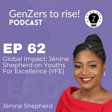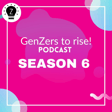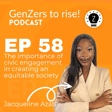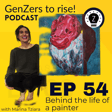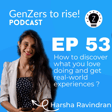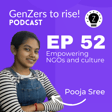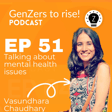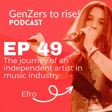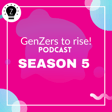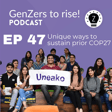Become a Creator today!Start creating today - Share your story with the world!
Start for free
00:00:00
00:00:01

Learning how to tackle controversial topics with Sophie Beren - Founder and CEO of The Conversationalist
In this episode we talk to Sophie Beren about her organization, the conversationalist. We explore the importance of controversial conversations through this process. Is it possible to maintain civil conversations when everyone has a different point of view? We also touch on other topics such as social media growth and audience engagement.
Sophie Beren social media: https://lnkfi.re/sophie-beren
Follow ChangemakerZ: https://go.changemakerz.org/follow
Episode's page: https://podcast.changemakerz.org/sophie-beren
Produced by Vasilis Skarleas
Transcript
Introduction to Changemaker-Z
00:00:01
Speaker
Hello everyone, I'm Kennedy. And I'm Vasiles. We run Changemaker-Z, a student-run initiative that aims to empower, educate, and connect engineers interested in entrepreneurship. We interview teenagers with impactful projects and create resources to help you change the world. If they can't do it, so can you.
00:00:23
Speaker
On this podcast, we discuss the logistics of creating different types of projects with Gen Zers who have already done it. We will leave our social media and website information in the description.
00:00:46
Speaker
Welcome to
Meet Sophie Baron and The Conversationalist
00:00:47
Speaker
another episode of Gen Z'ers to Rise podcast. This is an extremely unique episode since we have a special guest for you today. Today you will meet Sophie Baron, the main host and creator of The Conversationalist, one of the biggest Gen Z centric projects to exist today. Welcome Sophie, nice to meet you.
00:01:04
Speaker
Kennedy, thank you so much. That was the nicest intro. Vasilis, thank you for having me. I can't wait to get to know y'all better. So excited to have you on. You know, what is the conversation list in its different media types? That's a big
Evolution of The Conversationalist
00:01:19
Speaker
question.
00:01:20
Speaker
The conversationalist is a unifying platform. We are on a mission to unify the world and break open echo chambers. And we started as a media platform. During COVID, we evolved to a global community. And now we're evolving back in to this education space where we're creating different projects, events, and multimedia concepts to really educate our generation on how to have hard conversations. So
00:01:47
Speaker
Right now, we're currently working on launching our brand new talk show. It's called POVs, like points of view for Gen Z. And we're all about having the hard conversations because that's how we're going to unify. That's amazing. And I know you kind of mentioned echo chambers and hard conversation. What sparked the creation of the conversationalist?
Sophie's Background and Inspiration
00:02:09
Speaker
So have either of you ever been to Kansas? No. Fosselas, have you been to Kansas?
00:02:16
Speaker
I am from Greece, so no. Isn't that where Dorothy's from? Yes, that's exactly right. That's where Dorothy is from. And that's actually where I'm from too. Most people haven't even heard of Kansas. And so growing up in my community, I immediately felt different. I think I learned from an early age that I was unlike a lot of my peers and largely for a reason that I couldn't control.
00:02:45
Speaker
I was the only Jewish kid in my entire community and largely my school besides my siblings. So growing up, I had a really hard time fitting in because I felt like my peers didn't really understand me. And so that led me to feel very early on in my life, like I didn't have a voice. And I think growing up in that community and in that environment, I also realized that everyone around me was pretty similar. And so,
00:03:13
Speaker
When I followed the yellow brick road all the way to the east coast, I went to Penn for university. And I quickly realized that all along I had a voice and every single person has a voice. But oftentimes we only feel like we're allowed to use our voices if someone else gives us the permission to do so. And so.
00:03:34
Speaker
This was really the idea behind the conversationalist. I wanted to create a destination and a place and a vehicle for every young person to come together and acknowledge each person's unique voice to have conversations that matter. So that's a little bit about why I started it. And I just really believe that today that's so important for every young person to realize that we all have a voice and we all need to use them to make the world a better place.
00:04:02
Speaker
I totally understand what you say. Basically, sometimes it's difficult to find a way to use your voice. And that's why we started the podcast. We want you to use our voice with a better way. And that's great how you started in the story behind the conversational list.
Creating Table Talk
00:04:20
Speaker
What steps did you take to turn this idea into a reality?
00:04:24
Speaker
It's a great question. And also I completely agree. I love what the two of you are working on. And it's so inspiring to see how you use your voices to make an impact in the world. So I'm just so happy to be here.
00:04:35
Speaker
And I guess the steps that I took really started at Penn. So as soon as I had this realization that I had a voice, I said to myself, okay, I want to go out and use it, but I didn't know how. So I was a wide-eyed freshman going all around my campus, and I was that person that would introduce myself to everyone.
00:04:56
Speaker
I was making friends left and right in the dining halls in the classroom. But I quickly realized towards the end of freshman year that everyone kind of stuck within their own groups of people who were like them. You know, it's it's an interesting concept that we tend to flock with people who look like us and think like us. And I think towards the end of my freshman year, I finally realized, wow,
00:05:18
Speaker
This is a problem. Why are we coming to college to only hang out with people who are like us? The whole purpose is to get to know people from all walks of life. So I wanted to do something about it. And I decided to start a club on my campus. So that was the first step I took. I started a club way back when it was called Table Talk, kind of like the conversationalist 1.0. And the whole purpose was to get people together outside of the classroom and meet people from different walks of life to have conversations.
00:05:48
Speaker
And so I just started it right there on my campus. I emailed every leader across the entire school, asked them to grab coffee to tell them about my idea. So I think I'm such a proponent of the cold email. So anyone out there who's listening, just go for it. The worst thing that can happen is someone says no. So put yourself out there, take that risk. And for me, it was really starting that campus club to really start something.
00:06:14
Speaker
And then that moved over to what the conversationalist is today, but in the middle space, I scaled table talk to over 80 campuses. And that was really the beginning of my journey that led me to where I am now. I love that. I intentionally made sure to go to school out of my state because our main college here that most of people go to at my high school, at least, I was like, I do not want another high school 2.0. I want to branch out and I want to meet new people. So I love that.
00:06:44
Speaker
That's it. That's what it's all about. So I'm so happy to hear that you did that. So we're going to have a little break and we will come back to you shortly. And how did you raise funding? Like a project like the conversationally started from the university campus, then the team was created. And how about the funding process?
Building The Conversationalist
00:07:07
Speaker
Yeah. So Table Talk is a nonprofit.
00:07:10
Speaker
So I really had a lot of experience both at Penn starting this from the ground up and also receiving my master's in nonprofit leadership to understand how to raise funds, how to build relationships with donors, and how to fund a project entirely from the start. So at the beginning, I tapped into a lot of my university's resources and really those resources translated as people.
00:07:33
Speaker
right? You hear the term all the time. Your network is your net worth. And I really tried to lean into that. So the first I would say four years of my entrepreneurial journey was developing and building relationships. So that was step one. And if you're starting something on your campus, lean in to what your school has to offer you. And I was so pleasantly surprised by
00:07:54
Speaker
how many different grants we could apply for and the different funding sources that we could receive early on in the game. So that was Table Talk. And then transitioning into the conversationalist, I wanted to make sure that whatever we were starting, I could start from the
00:08:09
Speaker
the lowest MVP stage, the minimum viable product. I needed to make sure that this was a realistic concept that people wanted and needed. So I started by just receiving enough funding to conduct market research. I went out, I interviewed a ton of people, synthesized the data to better understand why our generation is failing to connect and failing to have these conversations. So again, tapped into my network, tapped into the people who I knew to help make that happen.
00:08:38
Speaker
which opened up more doors to be able to raise some funding from friends and family. So that was how I was able to raise funds. And I just could not encourage someone more to lean in to who is around you and who you're one degree of separation away from as well. Well, Sophie, you radiate such like positivity and good energy. So I'm not surprised like you're someone I like people want to be around. So I'm honored. I feel the same way about you two. I hope we can meet in person one day.
Applying Network Theory
00:09:08
Speaker
Okay, well, you have a bachelor degree in communications. How does this help you build your following? That's a great question. So communications for me at Penn really helped me understand why people communicate and how people communicate. And as Gen Z, we're digital natives, it really helped me lean into why our generation communicates 24, 7, 365. And so I think something interesting that really bled into my work
00:09:37
Speaker
with the conversationalist was studying network theory. I don't know if either of you have ever studied that before, but it really opened my eyes to how we're connected beyond digital media and social media, but just as human beings. And I know I mentioned this a moment ago when we talked about my journey at Penn.
00:09:56
Speaker
But I realized that there was an actual philosophy behind why people were gathering with people who were like them. There's an actual theory out there called birds of a feather that showcases how we're so interconnected and why we gravitate towards people who are like us and why the echo chamber exists. So this really allowed me to better understand human psychology within the communication space to better understand how to break open those echo chambers, which was super interesting.
00:10:27
Speaker
Yeah. Isn't it funny? I feel like as I've grown up, all those cheesy sayings of when we were little, they start to become really true. So true. All of them. Literally all of them. Do you have any tips for people looking to grow their projects on social media? Yeah. I think at the end of the day,
00:10:45
Speaker
It all goes back to who you are as a person and the value that you bring to the world. So whether it's growing your social media following, starting a project from the ground up, making any sort of impact in the world, I wholeheartedly believe that it has to connect to who you are as a person. I learned this from my mentor, my branding coach, Rich Keller,
00:11:08
Speaker
that at the end of the day, who you are should inform what you do, not the vice versa. And so with that in mind, for me, I discovered over the past couple of years that I am a unifier and I'm on this earth no matter what I'm doing to bring people together and have these important conversations. So everything I do on my socials
00:11:30
Speaker
is trying to give that value to my community, really helping them unify in their own lives and making sure that everything I'm doing ladders up to my core value. So it sounds super meta, I know. But at the end of the day, if you can identify your core value, you can better emulate that out to the world.
00:11:49
Speaker
and actually have it translate to things like social media graphics and Instagram story polls and different types of offerings you can create to then go out and give that value to others.
Engaging Followers
00:12:01
Speaker
It's true that your social media, they do have many, many, many polls and engagement content. So in fact, how do you engage followers after askwiring them? This is something that a lot of organizations struggle with, including ourselves.
00:12:16
Speaker
Totally. And this sounds so simple, but it really goes back to conversation, right? At the end of the day, all human beings want, in my opinion, to be heard, seen, valued, and understood. And in any way that you can give that to someone, even in the smallest ways, is how I've been able to engage and create those community ties within my audience and my network. So if I'm posting about,
00:12:43
Speaker
a controversial current event or starting a conversation on my stories, I try to make sure that I can let those individuals feel heard and
00:12:53
Speaker
feel validated in sharing their voice and sharing their opinions. And something that we do at the conversational list that easily shows this is we oftentimes use the ear emoji. And it really just for us means and signifies, I hear you, I'm listening. And that's just even the simplest of ways that we can show someone that we hear them. So if someone sends me something or if anyone's interacting in our app on Geneva,
00:13:18
Speaker
We always react with an ear to let that person know that we hear them. And that small interaction can go such a long way. Yeah. I love that so much. And I saw like you were holding up a little paper ear and like you're in like podcast or. So, you know, congratulations for being featured on Social Entrepreneur Magazine 25 under 25. What does social entrepreneurship mean to you? Thank you so much. I still can't believe that happened. Social entrepreneurship to me
00:13:47
Speaker
means utilizing that core value that I spoke of earlier to go out and actually make a difference in the world. So I'm such a believer that if you identify a problem in society within your friend group, on your sports team, at the dinner table,
00:14:05
Speaker
It's up to us to solve it, right? And we can't just wait around for someone else to go out and make that positive impact. So social entrepreneurship to me is almost taking on that responsibility to go out and create that change in our world. Oh, wow. And you run a global community to unify the voices on the Geneva app, like you mentioned, with more than 12K members. So tell us more about what you guys do on the Geneva app, some events,
00:14:34
Speaker
Yeah, of course. So our community really was born out of the pandemic. We decided to move everyone over from our community to the Geneva app and we love them. We're really good friends with their team. And on the app, it's filled with young people from all around the world talking 24 seven about everything under the sun that impacts us from politics to mental health,
00:14:59
Speaker
to racism, to current events, to pop culture and everything in between. And so it's really helped to facilitate that core part of our mission, which is to unify our generation and actually have a place for everyone to go to, to talk to one another.
00:15:15
Speaker
And so we have different rooms within the app. If you picture a Discord or a Slack channel, we have different rooms for different conversations. And it's a mix of audio, video, and chat communication, which is awesome because you can connect with your friends via video or audio like you would on FaceTime or Clubhouse, but also chat. And so we host different events to help us further connect our community. And I'll share one that I absolutely love.
00:15:42
Speaker
We hosted every Monday night, it's called And We're Live. And every Monday night, we drop a super spicy, super controversial topic into one of our chat rooms. And for 30 minutes only, our community goes at it. They just type and type and type and share all of their views and opinions on that one central topic. And right at the 30 minute mark, we close the room. So it's a really exciting moment for everyone to come together because it's 30 minutes only.
00:16:09
Speaker
but we get to actually have that conversation in practice. So overall, the Geneva platform is just an incredible hub to house our community in so our members can connect, understand one another better and actually have these conversations 24 seven. I can confirm it 100%. I am member of the Geneva app on the conversational list. And when I wake up in the morning, more than 200
00:16:34
Speaker
Notifications on my phone from all the different channels. I'm so sorry. No, no, no, no. I had so many notifications. And you can become a member too by following the link in the description below. Also, you just launched a new talk show and you have been featured on a billboard in New York City. Tell us more about your social mission and where we can find it.
Launch of POVs
00:16:57
Speaker
Yeah, of course, and thank you so much. That was probably the wildest day of my existence, seeing my face on a billboard in Times Square.
00:17:07
Speaker
After building the community on the Geneva app, we quickly realized that we wanted to actually create a product that helped us drive our mission of unifying the world. So we decided to launch the first ever Gen Z talk show. It's called POVs with a Z for Gen Z. And the whole purpose is to actually have those echo chamber breaking conversations in practice
00:17:29
Speaker
but it's really the only show out there on the internet and in the world where we actually have these hard conversations from multiple points of view. Our platform is all about welcoming all voices to the table because we're a nonpartisan platform and so it's really interesting to be able to
00:17:46
Speaker
to break open our echo chambers and hear those perspectives from people whom we may have never interacted with before. So we have really exciting episodes lined up for season one that we're going to be launching hopefully in the next couple months. We're working out all of the logistics now. We put out a casting form and got 400 responses in a week and a half, which was crazy.
00:18:07
Speaker
And so we're trying to figure out the best action plan to truly have these hard-hitting conversations. And so that's a little bit about the show, and it's really just a place for our generation to be heard. Yeah. Well, I love that you guys are not shying away from these difficult conversations. And I feel like a lot of people are too scared to say anything because people are just going to judge instead of actually giving them a chance to learn.
00:18:34
Speaker
How can we remove the stigma around controversial topics? This is what keeps me up at night and gets me out of bed every day, but it's tough. It's tough, right? Because I think we live in a world that maybe we've created as digital natives, where we have to walk on eggshells all the time when it comes to these conversations for fear of being canceled. And so I think removing the stigma
00:18:59
Speaker
Again, it sounds so simple, requires talking about it. I think the only way we're going to actually close the divide is getting closer together. And I think in addition to just talking, I think we also need to remove the stigma surrounding what conversations are. And I think there's a common misconception out there that says that if you have a conversation, you're expected to change your mind.
00:19:25
Speaker
And I think if we could all kind of acknowledge from the get-go, maybe just set a little intention for any hard conversation you have. Try to remind yourself that at the end of the day, a conversation is intended to listen to someone else, to learn, to grow, and to better understand their experiences that differ from your own. And I think if we remove that pressure to try to bring someone over to your side or to change their mind, we can actually have a conversation with the right intentions. And I think that,
00:19:54
Speaker
is the pathway to breaking down the stigma. Yeah, I agree. And we need a whole other podcast episode to talk about cancel culture. Tell me about it. But I'm starting to feel like it's one of the worst things that our generation is doing right now. And it's really not helping as much as putting us back. I couldn't agree more. So let's table that conversation for another second. I'm sweating. Same.
00:20:23
Speaker
Also, when we are so many people discussing a humming conversation about all these different projects, it's impossible for everyone to agree with all the points of views. So how can we create respectful dialogue when we might not agree with all points of view? Again, Vasil is asking me the hard-hitting questions, but I think at the end of the day, not only do we need to set an intention
00:20:51
Speaker
for these conversations, but I think we need to get back to the essence of who we are as human beings. And I think sometimes we forget to treat the people we're having conversations with as equals, right? Like, I think conversations have to start from a place of a shared humanity and acknowledging that we all have a right to exist and come as we are.
00:21:11
Speaker
And I think if you can kind of check those boxes before you enter the dialogue, you can actually create that respectful environment because you're acknowledging that that person has a right to share their ideas just as much as yours. And so I think that's step number one. And then step number two has become the mantra by which I live my life, which is listen to others with the same passion that you feel for being heard.
00:21:37
Speaker
And so I think it's so important that we remember that if you are having a conversation with someone and you really, really want to get your point across, try to remind yourself that if you listen with that same passion for someone else's ideas, they are so much more likely to give that right back to you. So I think those two ingredients combined will help us create those more respectful conversations, but it goes back to kind of sharing our common existence as human beings.
00:22:08
Speaker
I feel so inspired right now that I think that you should write a quotes book with what you're saying right now. Oh my God. No way. I am so honored you even thought that. But it's just those little things add up, right? Like it seems so simple and trivial just to say, Hey, let's have a conversation or hey, let's make other people feel heard. But those are the basics that I think we need to get back to in order to actually unify. So
00:22:37
Speaker
I appreciate you saying that. And what does it mean to break our echo chamber? So the echo chamber is a really interesting concept that I didn't know anything about before I started this. And
Breaking Echo Chambers
00:22:51
Speaker
I think it goes back to that realization I had at Penn, right? Like we without even knowing it, end up in communities and friend groups and social media networks that oftentimes reflect ourselves. And
00:23:05
Speaker
I think it goes back to that network theory, right? Because we feel comfortable when we're around people who are like us. And the echo chamber becomes that enclosed space where you only hear ideas and beliefs that reaffirm your own. And so this has become especially toxic on social media. I don't know if either of you have seen the social dilemma on Netflix, but that is so real.
00:23:30
Speaker
When we talk about breaking our echo chambers, to me that means simply coming into contact with someone else who lives outside of your silo. So for me, growing up in Wichita, Kansas, I was in a fairly homogenous community. It was a primarily white, privileged, Christian community. And so for me, breaking out of my echo chamber could mean joining a community like The Conversationalists where I'm actually interacting with people
00:23:59
Speaker
who might live in a different state, a different town, come from a different culture, race, religion, and background to simply understand someone else's point of view, but also lived experience. So breaking your echo chamber does not mean changing your mind, you know, having to compromise anything you believe in. It just means being able to expose yourself to people and to ideologies and opinions and beliefs that are different from your own.
00:24:30
Speaker
I love that. And I feel like, I don't know if anyone else agrees with me, but I feel like a reason people don't want to break their echo changers because they're scared to change their beliefs. They're scared. Like they don't, they're just scared to change the release, basically. They don't want to, they don't want their ideologies to be broken or threatened. And change is scary, right? I think it's so intimidating to even want to expose yourself to things that you're not privy to in your environment.
00:24:59
Speaker
But I think it's so important to remember that at the end of the day, we're never going to grow if we can't see the world beyond our own experiences. And so I think that is something that I've learned to abide by every single day. I wear a ring on my finger every single day that reminds me of this saying, which is the moment when you realize that the rest of the world doesn't think like you, that's when you grow.
00:25:25
Speaker
Okay, maybe you should do that quote book. I'm writing that one down. The conversation list has many conversations relating to current events like the women's movement. How can people stay informed? How can we get involved? And how can we stay engaged with these issues? Great
Staying Informed with Multiple Viewpoints
00:25:47
Speaker
question. So for me, I try to do a daily news sweep.
00:25:53
Speaker
So I tried to hit up a couple of different platforms just to kind of see what's happening out in the world, because sometimes I end up just consuming news from my TikTok for you page, which might not be the most credible source. So I tried to just check out a couple of platforms, even if that means Twitter, a couple of the major news networks, and even vehicles like the cram or the skim, you know, different newsletter publications that are kind of sharing what's going on in the world. Also some great podcasts would be happy to recommend, but for me,
00:26:23
Speaker
I think it goes beyond just doing a daily news sweep. And so I also try to check out this awesome website called allsides.com where they actually show you the media bias in a lot of current events. So they'll give you a current event story and they'll show you the headlines from the left, the right, the center. And it's important to kind of recognize how there are multiple sides to every story and not just a left or right, a black or white. And so,
00:26:49
Speaker
I love allsides.com. And then I've also just got a shamelessly plug that if you want to come to my Instagram every day, I'm posting different current events and asking polls and questions that just allows people to think and be informed about what's happening in the world.
00:27:05
Speaker
And then I share different people's responses and opinions, so you can actually see the different points of view, so you can kind of choose for yourself about what you believe in. Because I don't think we need to know it all. None of us are experts, but if we can just kind of stay informed with different points of view, then we can kind of think for ourselves. I think that this is for today. We had a very great conversation with the founder and CEO of The Conversationalist. Thank you so much Sophie Beran for being on the show.
00:27:35
Speaker
Thank you both so much for having me and can't wait to watch you continue to inspire our generation to use their voices for good. Thank you. So don't forget to check out the conversation list and their amazing community. All the links will be in the description. So keep changing the world, guys.
00:27:59
Speaker
Thank you guys for listening. We hope you enjoyed our conversation. We had such a great time. Make sure to leave us a review. If you want more Changemakers content, you can follow us on Instagram at ginsears2rise and on Facebook at changemakerse.
